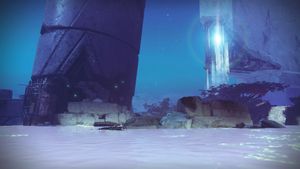Radiolaria
From Destinypedia, the Destiny wiki
For more information, see the citation policy.
| Radiolaria | |
|---|---|

| |
| Overview | |
|
Objectives: |
Become the only being in existence |
|
Encountered: |
|
Radiolaria, referred to by some, including Clovis Bray I[1], as "Vex Milk", are microscopic silica-based organisms that make up the biological component of Vex constructs. Massive concentrations of radiolaria are often found on planets transformed into machine worlds.
History
Origins
In the state preceding the universe as commonly understood, the Vex first existed as abstract patterns, which escaped to the universe when the Light and the Darkness began warring with one another. These patterns were able to influence the chemistry within the liquid cores of comets, creating the precursors of a physical substrate to house their consciousness. These comets then rained down on lifeless planets, and the first radiolaria evolved from the chemicals within.
The Collapse
Shortly prior to the Collapse, both the Ishtar Collective and Clovis Bray I conducted detailed studies of Vex radiolaria. In addition to cataloging their physical characteristics, Clovis I also discovered that exposing radiolaria to the paracausal force he called "Clarity" produced a substance that he called "Alkahest" which, when introduced to the hardware of an exomind, miraculously solved the "loop/billboard/crash" problem that had until that point unavoidably plagued early exominds.
Radiolaria were encountered again by humanity after the Collapse when the Exodus Black crash-landed on Nessus, when the ship's AI Failsafe observed them terraforming the planetoid.
City Age
The Titan Kabr, while lost in the legendary Vault of Glass, consumed radiolarian fluid from an oracle as he began losing his sanity. He ultimately became lost to the Vex.
Biology
- "Chemically, the Vex milk is an alkaline solution of dense salts in water. The salts range from sodium and calcium to lead and even (in barely detectable amounts) plutonium. Not good to drink.
Suspended in this solution are cells of silicoid structure, 100-200 micrometers in size. Their shapes are heterogenous but always geometric, reminiscent of Earth's radiolarian protozoa. Many have needle-like pseudopods, which transform between stiff spines and motile whips on the basis of some piezoelectric response. Imaging of internal structure detects a nucleus, and a genetic molecule analogous to DNA (though I speculate read-write times are much faster, on the order of milliseconds, perhaps exploiting some quantum effect)." - — Clovis Bray I
Vex radiolaria are microscopic organisms that are typically suspended in a briny white, luminescent fluid, together often called "Vex milk" due to its superficial resemblance. They are found on planets transformed by the Vex, such as Nessus. They control the mechanical chassis of the Vex from a container usually found within their chests. On some Vex units this "brain" is located elsewhere; for example, behind the eye on Harpies or in the abdomen on Cyclopes.
Vex milk is non-Newtonian, highly conductive, and noncompressible. Its viscosity and surface tension are variable: it can form a resistant membrane, or climb the walls of a container like a superfluid. The milk can also store kinetic energy in zero-viscosity vortices, essentially liquid flywheels. This allows them to, for example, retain the motion of something stirring them so that they may use it in the future.
The movement of radiolaria within the milk is synchronized on multiple levels, forming orderly patterns both in space and across time. Radiolaria and fluid together form a computational medium suitable for complex calculations.
When radiolarian fluid comes into contact with non-Vex matter, it will attempt to turn the host into a Vex unit. Examples include Kabr, the Legionless, who drank from an Oracle and was transformed into a Vex, and Asher Mir, who lost an arm to radiolarian "infection". Another example comes from stepping in radiolaria in-game, as it will slowly damage players. At times it even possesses a hallucinogenic and entheogenic effect.[2]
References
| ||||||||||||||||||||||||||